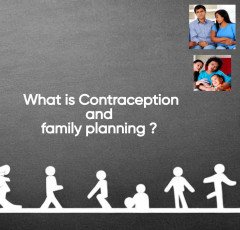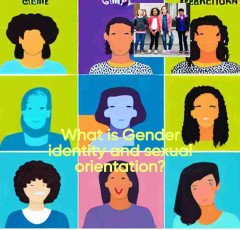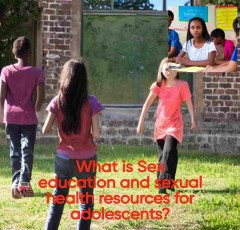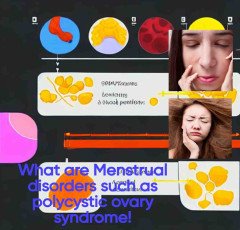
What is Contraception and family planning ?

The term "contraception," usually referred to as "birth control,"
describes techniques or tools used to avoid becoming pregnant by either preventing egg fertilization or inhibiting the implantation of a fertilized egg in the uterus. Contrarily, family planning is the process of limiting the number and spacing of children within a family by the use of contraception or other methods.
In addition to non-hormonal techniques like condoms, diaphragms, cervical caps, and intrauterine devices (IUDs), there are other hormonal methods of contraception, such as birth control pills, patches, and injections. While some treatments are accessible over-the-counter, others need a doctor's prescription.
Family planning is a crucial component of reproductive health and can assist people and couples in making decisions about the number of children they want to have and when to have them. As well as lowering the risk of issues affecting maternal and baby health, it can aid in the prevention of unplanned pregnancies.
Due to the fact that it enables people to pursue their educational and professional aspirations as well as financial
stability prior to beginning a family, family planning and contraception can also have favorable social and economic effects.
Additionally, it can lessen the demand on scarce resources and the negative effects of population increase on the environment.
Some forms of contraception can offer extra health advantages in addition to avoiding pregnancy.
For instance, hormonal contraceptives can lower the incidence of some malignancies and pelvic inflammatory disease while assisting in the regulation of menstrual cycles. In addition to preventing pregnancy, some methods of contraception, including condoms, can help guard against STIs.
It is crucial to remember that there is no one-size-fits-all strategy for family planning and contraception.
The approach chosen is determined by a number of variables, including lifestyle, medical history, and personal preferences. It is advised that people speak with a healthcare professional to choose the approach that would work best for them.
It is a fundamental human right to have access to family planning and contraception, and advancing access to these services can have significant advantages for people, families, and communities.
Despite the advantages of family planning and contraception, many regions of the world still have access restrictions.
These obstacles may include a lack of services, cultural and societal standards, a lack of knowledge or education, and financial limitations.
There have been numerous initiatives, including government-funded programs, non-governmental groups, and multinational collaborations, aimed at enhancing access to family planning and contraception. These initiatives are meant to enhance education and awareness, lower financial barriers, and offer a variety of contraceptive methods and services.
In addition to expanding access to contraception
, it's critical to address broader social and economic issues
like gender inequality, poverty, and illiteracy that may have an impact on reproductive health.
It is possible to advance gender equality and social justice while also improving reproductive health outcomes by addressing these underlying causes.
Family planning and contraception are crucial aspects of reproductive health and can have a
big impact on people, families, and communities. Reducing unwanted births, enhancing mother and child health, and fostering social and economic growth can all be achieved with more access to services and knowledge.
By aiding in the slowing of population increase and easing the burden on finite resources, family planning and contraception can also contribute to environmental sustainability. This is particularly critical given the expanding global population and the pressing global issues of resource depletion and environmental deterioration.
The special requirements and viewpoints of various communities and individuals must also be taken into consideration in efforts to broaden access to family planning and contraception. The choice of contraceptive techniques and the impact on access to services can be influenced by cultural and religious beliefs, as well as by individual values and preferences.
Adopting a rights-based strategy that puts autonomy, dignity, and equity first is crucial for addressing access hurdles and promoting reproductive health and rights.
This includes making certain that people have the knowledge, tools, and assistance necessary to decide on their reproductive health and family planning in an informed manner.
Family planning and contraception are essential aspects of reproductive health that have significant effects on the social, economic, and environmental spheres. Promoting gender equality, lowering unwanted pregnancies, enhancing mother and infant health, and advancing sustainable development all depend on ensuring access to these services.
It's also critical to understand that simply having access to family planning services and contraception is insufficient.
Accurate information, education, and support are necessary for effective use of contraception, as well as access to top-notch medical care.
This entails having access to thorough sexuality education, therapy, and aftercare.
Addressing social and cultural issues that may affect the use of contraception and family planning services is also crucial.
These elements may include discrimination, stigma, and unfavorable viewpoints towards the autonomy of women and their rights to sexual and reproductive health.
Access to family planning and contraception should be improved, and these initiatives should be integrated into a larger plan to advance human rights, gender equality, and empowerment for women.
It also entails tackling the underlying causes of gender inequality, such as prejudice and violence against women, as well as advancing women's access to political, economic, and educational possibilities.
Family planning and contraception are essential elements of reproductive health and rights.
Promoting gender equality, lowering unwanted pregnancies, enhancing mother and infant health, and advancing sustainable development all depend on expanding access to these services. However, it's also essential to address social and cultural issues that may affect how well these services are used and may be accessed.
The promotion of access to family planning and contraception services must be based on evidence-based strategies that take into account the various needs and viewpoints of various communities and individuals. This necessitates a comprehensive strategy that includes not only service delivery but also advocacy, policy development, and education.
Promoting access to family planning and contraception services requires the cooperation of governments, civil society organizations, and international organizations.
The development of policies and initiatives that support access to services and information, as well as promoting public awareness of the significance of reproductive health and rights, are some examples of this.
Promoting men and boys' participation in campaigns to enhance reproductive health and rights is crucial.
In order to advance gender equality, support women's autonomy, and challenge negative societal and cultural norms that
restrict access to family planning and contraception, men and boys can play a crucial role.
Conclusion:
Promoting reproductive health and rights, gender equality, and sustainable development all depend on expanding access to family planning and contraception services. This calls for a thorough strategy that takes into account the social, cultural, and economic issues that may affect people's ability to access and make effective use of these services.
It is more crucial to understand that encouraging access to family planning and contraception services is a question of public health in addition to human rights.
Family planning is one of the 17 essential services that the World Health Organization (WHO) has identified as being vital to achieve universal health coverage.
Access to family planning services can aid in reducing the risk of unwanted pregnancies, which can reduce the risk of unsafe abortions, maternal and newborn mortality, and long-term health effects. Providing access to contraception can also assist in limiting the spread of HIV and other STDs.
Family planning and contraception can also offer economic advantages in addition to health advantages.
According to studies, spending money on family planning services can be profitable because it lowers healthcare expenses, boosts productivity, and fosters economic growth.
In conclusion, advancing access to family planning and contraception services is important for public health and economic growth in addition to human rights and gender equality. For everyone to have access to these vital services and to be able to make decisions about their reproductive health and rights, governments, civil society organizations, and international organizations must collaborate.
Promoting access to family planning and contraception services is crucial for tackling global issues including climate change and environmental sustainability.
Natural resources may be stressed by rapid population increase, and environmental damage may worsen. Contraception and family planning can promote smaller family sizes and lower unplanned pregnancies, which can lead to a more sustainable future.
It is also crucial to understand that promoting access to family planning and contraception services entails more than just ensuring that people can physically access the services, it also entails making sure they have the knowledge, education, and support they need to make decisions about their reproductive health.
Access to family planning and contraception services, as well as the promotion of healthy relationships, the prevention of sexual assault and harassment, and the addressing of gender-based violence and discrimination can all be advanced by comprehensive sexuality education.
This contains information on the full range of contraceptive options as well as the health and legal aspects of sexual and reproductive rights.
Access to family planning and contraceptive services must be encouraged if human rights, gender equality, public health issues, and sustainable development are to be advanced. These objectives must be met through a multifaceted strategy that includes not just service delivery but also advocacy, policy creation, and education.
Must acknowledge that marginalized and vulnerable groups, such as those who are poor, refugees, or those who reside in places affected by conflicts or humanitarian crises, frequently have restricted access to contraception and family planning services.
The requirements of these people must be given priority in any initiatives to increase access to family planning and contraception, particularly by guaranteeing that services are available and appropriate for their cultural contexts.
Promoting access to family planning and contraception services must be based on a human rights-based philosophy that values each person's inherent worth and dignity and respects their freedom to make choices regarding their own bodies and lives.
For the advancement of reproductive health and rights, gender equality, public health, environmental sustainability, and human rights, access to contraception and family planning services is crucial.
To achieve these aims, a comprehensive strategy that takes into account the social, cultural, economic, and political aspects that may affect access to these services is needed. By giving these initiatives top priority, we can contribute to ensuring that every person as the capacity to fully realize their potential and make decisions regarding their reproductive rights and health.
The terms "contraception" and "family planning" relate to the techniques and products used to stop unplanned pregnancies as well as to schedule how many children to have when. Access to family planning and contraceptive services must be encouraged if human rights, gender equality, public health issues, and sustainable development are to be advanced.
These objectives must be met through a multifaceted strategy that includes not just service delivery but also advocacy, policy creation, and education. The needs of disadvantaged and vulnerable groups must be given first priority, and any efforts to increase access to family planning and contraception must be based on a human rights-based philosophy that upholds everyone's individuality and dignity.
We can empower people to make informed decisions about their reproductive health and rights, support gender equality, advance public health, and work toward a more just and sustainable future for all by prioritizing initiatives to romote access to contraception and family planning services.
Must acknowledge that social justice and individual choice both play a role in determining who has access to contraception and family planning services.
Access to these services can aid in resolving structural injustices and power disparities that may restrict people's possibilities and way of life.
For instance, gender-based violence and discrimination may be experienced by women and girls, which may restrict their access to chances for work, education, and other services. Women and girls can have more control over their reproductive lives by having access to contraception and family planning services, which can assist their social and economic empowerment.
Promoting access to family planning and contraception services can aid in attempts to combat global issues including poverty, famine, and climate change. These initiatives can assist to guarantee that resources are used more sustainably and fairly, and that communities are more resilient to the effects of climate change, by preventing unplanned pregnancies and encouraging smaller family sizes.
Access to contraception and family planning services must be encouraged if human rights, gender equality, public health issues, and sustainable development are to be advanced.
The needs and voices of marginalized and vulnerable people should be prioritized, and it is crucial to approach these efforts with a comprehensive and intersectional lens that acknowledges the social, economic, and political issues that may affect access to these services.
Recognizing that encouraging access to family planning and contraception goes beyond simply offering services to address underlying social attitudes and conventions surrounding sexuality, gender, and reproductive health.
Those who seek out or use contraception, for instance, may face stigma and prejudice as a result of detrimental gender norms and stereotypes, and the promotion of gender equality, the dismantling of damaging gender norms and stereotypes, and raising awareness of sexual and reproductive health and rights must all be included in efforts to enhance access to contraceptive and family planning services.
This might involve promoting thorough sexuality education in classrooms and communities as well as directing outreach and communication initiatives to vulnerable and underrepresented groups.
Recognizing the numerous dimensions and conditions that may affect access to contraceptive and family planning services, it is crucial that we approach initiatives to improve access to these services holistically.
We can contribute to the development of a society in which all people have access to the knowledge, tools, and support they need to make informed decisions about their reproductive lives by addressing social norms and attitudes about sexuality and reproductive health, advancing gender equality, and raising awareness of and understanding of these issues.
Furthermore, it's critical to understand that social justice and individual choice both play a role in ensuring that people have access to family planning and contraception services. Promoting social and economic empowerment, fostering sustainable development, and building a more just and equitable world for all depend on addressing systemic inequities and power disparities that can restrict people's possibilities and life choices.
Promoting family planning and contraception access is essential to attempts to advance gender equality, solve public health issues, and advance sustainable development. We can ensure that everyone has the capacity to succeed by adopting a comprehensive and intersectional strategy that tackles social norms and attitudes, encourages education and awareness, and fights for policy and system reform.
Yes, and it's crucial to understand that expanding access to family planning and contraception benefits society as
a whole as well as individuals. These initiatives can aid in addressing population increase, easing pressure on natural resources, and promoting sustainable development by promoting smaller family sizes and reducing unplanned pregnancies.
Additionally, expanding access to these services can support broader initiatives to advance social and economic empowerment, gender equality, and public health.
Advocacy
Policy creation, education, and service delivery should all be part of a comprehensive strategy to increase access to contraception and family planning services.
This could entail promoting policies and initiatives that support access to these services, raising public awareness of sexual and reproductive health and rights, and making sure that everyone, regardless of background or circumstance, has access to high-quality, reasonably priced, and culturally appropriate services.















 Online Marketing
Online Marketing  1150+Trendy kids coloring pages Bundle
1150+Trendy kids coloring pages Bundle  Artificial Intelligence
Artificial Intelligence  Smart Doorbell
Smart Doorbell  NordVPN
NordVPN  Favorite Company (Cuelinks)
Favorite Company (Cuelinks)  BEST SELLER TOP10
BEST SELLER TOP10  SOFAS
SOFAS  SEO Checklist
SEO Checklist  Creative Brief For Video Shoot
Creative Brief For Video Shoot  Graphics & Design
Graphics & Design  NordLocker
NordLocker  Online Technology Classes
Online Technology Classes  Hot Bags For Pain Relief
Hot Bags For Pain Relief  ASUS Laptop
ASUS Laptop  Women Fashion
Women Fashion  Top Rated From Amazon
Top Rated From Amazon  Best Sellers On Amazon
Best Sellers On Amazon  Hello Theme
Hello Theme  NordPass
NordPass  Acer Laptop
Acer Laptop  Sennheiser
Sennheiser  TitTok Revolution
TitTok Revolution  Best Selling Books
Best Selling Books  Only For The United States
Only For The United States  Men Clothing
Men Clothing  ASPINAL LONDON
ASPINAL LONDON  The Click Engine
The Click Engine  Best Home Appliances
Best Home Appliances  RPM 3.0
RPM 3.0  All Wireless Products
All Wireless Products  Unlimited access to classes on illustration, photography, design, film, music
Unlimited access to classes on illustration, photography, design, film, music  The Secret Email System
The Secret Email System  One World Collection
One World Collection  Amazon Best Selling Products
Amazon Best Selling Products  Unreal Engine 5 For Beginners Learn The Basics Of Virtual Production
Unreal Engine 5 For Beginners Learn The Basics Of Virtual Production  Best Robotic Vacuum Cleaners
Best Robotic Vacuum Cleaners  ELECTRONIC ACCESSORIES
ELECTRONIC ACCESSORIES 
















